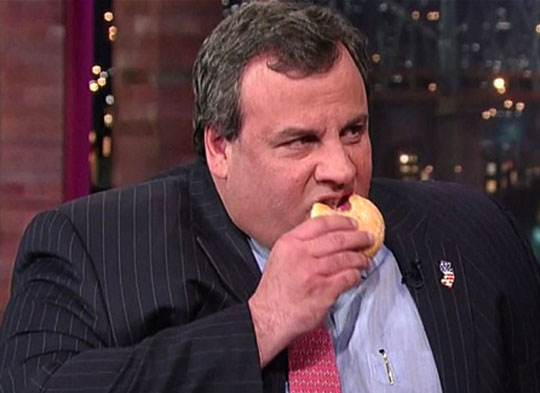
Does Chris Christie have a Rudy Giuliani-sized lump on his body politic?
While the fat jokes about New Jersey Governor Chris Christie started long before he was elected (recall Jon Corzine’s much-maligned ad from 2009), Christie’s political weight has been the only thing in the governor’s mansion packing on the pounds in recent months. Thanks in multiple parts to a weak Democrat challenger, a compliant press corps, and a Democrat-leaning special election held weeks earlier, Chris Christie’s 22% margin of victory in ultramarine blue New Jersey has vaunted him to the top of the incredibly-too-early-to-reasonably-speculate GOP sweepstakes.
Christie’s critics suggest his numerous derivations from conservative orthodoxy and penchant for picking fights with his own party spell his early primary doom – presumably because they’ve never met Mitt Romney or John McCain. But the early line of attack that does seem to be gaining some traction with the only segment of the electorate who cares this early – the punditry – is that Christie is too east coast, too combative. Too Rudy Giulianiesque:
Talk to early presidential state or Washington operatives and you hear the same thing over and over about New Jersey Gov. Chris Christie’s presidential prospects: He’s the second coming of Rudy Giuliani.
National Democrats have given the idea new life the past week, looking to ding Christie after allowing him to coast to reelection untouched. But the comparison is hardly new: Republicans have invoked it for years, and not in a favorable way – intimating Christie is too provincial and, like the former New York mayor, will prove too liberal to win his party’s presidential nomination. Even Sen. Ted Cruz (R-Texas) has made the analogy privately in conversations.
It’s become a proxy for the debate among Republicans about whether Christie will have staying power in Republican primaries dominated by social conservatives and tea party activists.
The search for over-arching narrative may not be confined to politics, but it’s tendencies towards bias and distortion of historical reality may be the most apparent in the political realm. Because whether Chris Christie is too moderate or not to secure the Republican nomination in 2016 will ride heavily on the same factors that influenced Rudy Giuliani’s disastrous 2008 bid – tactical execution.
Giuliani was given tremendous (and well-deserved) grief for his 2008 strategy. The complete lack of messaging; his bizarre and aimless New Hampshire campaigning; the “Florida firewall” after being decimated early in the primaries. Yet the great irony in Giuliani’s 2008 campaign was that his team’s political strategy won the nomination – it was just performed better by another candidate.
Few recall that until the late fall of 2007, Giuliani’s Iowa spending was second only to Mitt Romney – an under-the-radar attempt made via direct mail not to win the conservative Iowa Caucus, but simply place and defy expectations. Armed with a solid finish in Iowa, or so the strategy would have suggested, Giuliani could then win New Hampshire where the electorate was more favorable, and coast until Florida, where a major delegate victory could set him up for the early February Super Tuesday.
Sound familiar? It should – it was how John McCain won the nomination. McCain pulled his organization in Iowa early yet came in a surprising fourth with 13% (essentially tied for third). He won New Hampshire and Florida (and South Carolina). The difference? McCain knew how to execute a grassroots political strategy. As for Giuliani:
Giuliani’s [2008 campaign] was the Potemkin Village of presidential campaigns: What looked like a campaign was just a facade for the cameras and national media. It was artifice, disrespectful of the process and the voters. Perhaps this is what campaigns in New York City are, where everything plays out on TV and in the tabloids, where no grassroots grow in the concrete jungle.
Chris Christie, for all his political warts, doesn’t have the same political Achilles’ heel. His grassroots interactions are far from artificial. Like Giuliani, Christie will likely attempt to gain his first primary victory in New Hampshire. Unlike Giuliani, Christie’s visits to every coffee-shop and greasy spoon in the Granite State won’t come across as wooden as Hizzoner’s travels appeared.
What Christie truly may share with Rudy Giuliani is his greatest political opponent – his ego. Giuliani thought he could reinvent the primary wheel because he found it distasteful to hob-knob with Iowans and New Hampshirites. Christie may believe that he can land in Iowa or South Carolina and strong-arm his opponents into submission. Doing so will likely only result in a series of tense confrontations with electorates far less interested in Christie’s combative style of debate – perfect YouTube fodder. A wiser Chris Christie will carefully pick his primary battles, targeting the more friendly confines of the usual primary suspects in New Hampshire, Michigan and Florida.
But does that sound like Chris Christie?
Leave a Reply
You must be logged in to post a comment.